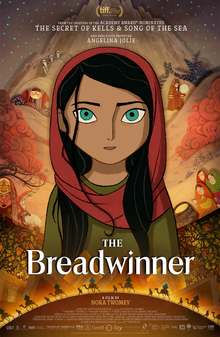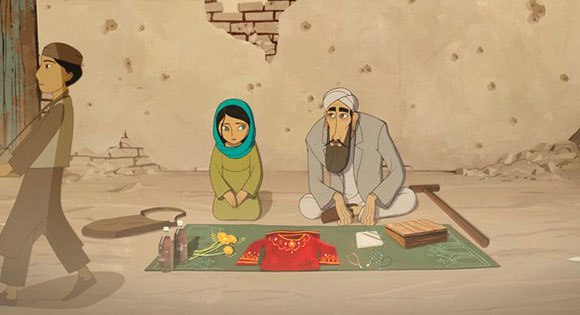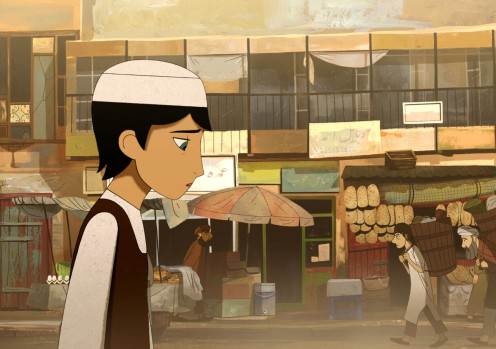
This post contains spoilers.
Generally, when it comes to movie adaptations of books, I prefer to read the book first. The Breadwinner, available on Netflix, I watched ignorant of the fact that the story began as a novel by Canadian author Deborah Ellis. Alas, one can only adhere to one’s arbitrary principles for so long.
The loss of literary introduction notwithstanding, the film still deeply resonated with me – meaning, in my language, that for a good couple of days after viewing I pondered the story, and the messages I drew from it.
The Breadwinner film chronicles the life of an Afghan family of five – Mother, Father, older sister Sorayaa, younger brother Zaki, and main character 11-year-old Parvana – under Taliban rule in 2001. During the Soviet-Afghan War (1979-1989), Parvana’s father, a former schoolteacher, lost his leg, so he resorts to selling wares on the side of the road and offering reading and writing assistance (“Anything written! Anything read!”), accompanied by Parvana.

The family struggles, but they survive, sustained by the food that Father’s humble enterprise provides and the stories he tells. “Stories remain in our hearts, even when all else is gone,” Father tells Parvana. The stories keep in memory the Afghanistan of old, made wealthy by the Silk Road.
This delicate balance falls upon Father’s sudden and unjust arrest by an impetuous young Taliban boy. Left without a male family member in a society where women cannot leave their homes without fully covering themselves and without the company of a male relative, Parvana disguises herself as a boy, Aatish, which means “fire”, to earn money in her Father’s fashion and, after meeting another disguised girl, Shauzia who goes by the name Deliwar, by working odd jobs.

“The clothing, the food, the family atmosphere, even the cane that the grandfather carried was carved and looked just like it was from here,” Sisters 4 Sisters founder Mina Sharifi said of the film [1]. An Afghan-American GWU student praised the film for focusing on a strong female Afghan character. “Finally,” she said, “we had our own stories told, from our point of view.”
Against the backdrop of the War on Terror, the word Afghanistan conjures images of terrorism, gender oppression, corruption, and poverty. In the eighteen years since the Taliban fell from power, civil war has torn the country more and more. It ranks as one of the poorest nations in the world and has combated countless instances of corruption in the last decade. Today, the threat of suicide bombings still looms and about 90% of women suffer abuse [2, 3].
In these conditions, how does one plan for the future now? How did one plan for the future before these times, under the Taliban when circumstances were worse?

To this question, The Breadwinner answers, “You have hope.”
The world of Parvana and Shauzia is one in which you have to be a boy, or disguise yourself as a boy, to go anywhere. It is a world in which soldiers can seize your father without warning or reason. It is a world in which you have to be careful to not step on land mines while travelling to work. It is a world in which a boy can mistake a bomb for a toy. It is a world where even the adults are afraid.
Nevertheless, Parvana and Shauzia dream. Shauzia tells Parvana that she is saving money to move by the sea, where she will sell trinkets to tourists. Parvana, a gifted storyteller and intelligent girl, imagines a future in which she can play the role of normal schoolgirl; to laugh and learn without fear of retribution, her family together and at peace. Near the end of the film, when war planes fly overhead and authorities begin blocking roads, you know that the prospect that the girls will realize these fantasies is slim.
The power of storytelling emboldens Parvana to continue hoping. I cheer her, but I do so with melancholy, not knowing exactly where her path will go. The film ends, and leaves me with the suspicion and fear that it won’t go the way she dreams.

Footnotes
- Kumar, Ruchi. “If Afghanistan Ran The Oscars, ‘The Breadwinner’ Would Triumph.” NPR, March 3, 2018. https://www.npr.org/sections/goatsandsoda/2018/03/03/590215035/if-afghanistan-ran-the-oscars-the-breadwinner-would-triumph.
- “Corruption.” GlobalSecurity.org, n.d. https://www.globalsecurity.org/military/world/afghanistan/corruption.htm.
- “Trying to live a normal life in the chaos of Kabul.” DW, September 27, 2019. https://www.dw.com/en/trying-to-live-a-normal-life-in-the-chaos-of-kabul/av-50601754.
It’s a wonderful review of a great movie. This movie is a tad bit underrated. People from South Asia especially feel for this movie. I’ve also recently started my analysis of this spell-binding movie. Do check it out: https://sayedwilliamsbabblings.wordpress.com/2020/04/13/analysis-the-breadwinner-parvanas-family/
LikeLiked by 1 person
Thank you for your kind comment, Sayed! It’s sad to hear that a movie that means so much to so many people is underrated. I’ll definitely pop over to your blog to read your analysis.
LikeLike